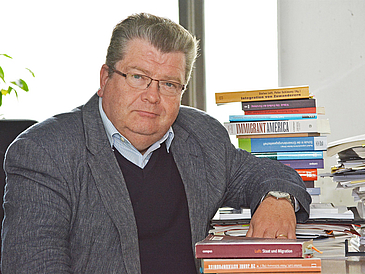Stefan Luft, a political scientist at the University of Bremen, recently presented his new book titled “Die Flüchtlingskrise” at the Leipzig Book Fair. The public interest is great and he was invited to Leipzig City Hall for a reading and discussion. Luft is an expert on migration and integration, policy areas he has been researching for more than 30 years. The Bremen scholar is frequently invited to take part in panel discussions and is often interviewed by the regional and national media.
Published by C.H. Beck in the “Wissen” series, the full title of his fourth book is “Die Flüchtlingskrise – Ursachen, Konflikte und Folgen” [The refugee crisis – causes, conflicts and consequences]. The Berliner Tagesspiegel says the 130-page monograph comprises a useful “compendium”, and the Frankfurter Allgemeine Zeitung praises how he “brings clarity to terms and aspects of legislation that often get completely mixed up in brief journalistic articles and reports”.
We put five questions to Stefan Luft:
You wrote your explanatory work in just two months from the end of September to end of November 2015. How did you manage to do that, and don’t events sometimes overtake the content of a book?
Luft: You can only do it so quickly if you’re already deeply into the subject matter. Any one starting from the beginning couldn’t possibly manage it. And the rapid sequence of events wasn’t a problem since I didn’t set out to summarize the diverse journalistic coverage but rather to make sense of the complex correlations. I had to condense this complexity in a manner which respects scientific standards while at the same time making it understandable to interested lay readers. But you are still right in a way: It was sometimes a little unnerving to learn of the fast pace of events when listening to the news on my car radio.
In your book, you say it’s hard to understand why the increased movement of refugees in 2015 wasn’t foreseen. How was the world to know what would happen?
Already in 2014, the United Nations High Commissioner for refugees drew attention to the pending crisis. First of all, the situation of civilians in countries like Syria where the refugees come from was deteriorating. Secondly, countries hosting refugees like Jordan and Lebanon with huge refugee populations were already struggling because they are economically weak themselves. The refugees had to agree not to look for work. It is the third reason, though, that I find crucial: Aid programs like the World Food Program were already massively underfinanced. Supplies of food and hygiene articles were further reduced. The people were left with no hope and saw other alternative other than to leave – and take their chances.
You also draw conclusions in your book: The development of a Common European Asylum System has broken down. Why?
Procedures were meant to be harmonized. To achieve this, the European member states had to transpose diverse regulations into national legislation. However, the standards for accommodation, basic needs and social services were not harmonized. The yardstick is always the social situation of the local population. This is why some countries are non-starters for the refugees. They want to go to Sweden instead of Bulgaria, for example.
There are calls to introduce a German immigration law. Would that have helped to defuse the situation?
That is an oft repeated call. But it would do nothing to ease the situation. Germany already has the most liberal rules in the OECD for migrants admitted to fill needed jobs. And it is fundamentally unacceptable to make forced migration subject to selection criteria. These people are allowed to stay because they are in need of protection, not because we might need their skills. It should also be noted that the classic immigration countries with established immigration laws refuse to accept any significant contingents of refugees.
You list a whole string of conditions needed for integration to be successful in Germany. Can you briefly name the most important ones?
Luft: The absolute prerequisite is that the flow of refugees is strongly reduced. The integration of a group in society always depends on its size. Ethnical colonies are usually an obstacle to successful integration. Our politicians have to realize and accept the fact that the Federal Government and the federal states need to make more finances available. For example, for education and housing. They will simply have to abandon entrenched ideas like “breakeven” or “debt ceiling”.
You can find more information on this topic under: http://www.stefanluft.de/

